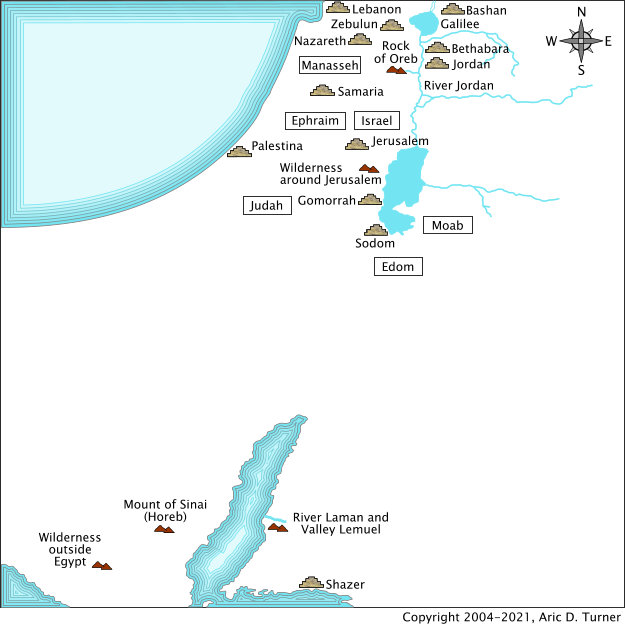The river Laman is in the wilderness near the Red Sea three days along the shore of the Red Sea south-southeast from a point on the Red Sea southward of Jerusalem. The river Laman flows through the valley of Lemuel. The river Laman is north-northeast of Shazer.
Commentaries (
view it on a map)
I NEPHI 1:30 [2:5]: And he came down by the borders near the shore of the Red Sea;
Commentary: This verse references the places of Jerusalem, Red Sea, river Laman, valley of Lemuel, and the wilderness around Jerusalem. The term 'he' refers to Lehi. The phrase 'came down' indicates the Red Sea is lower in elevation than Jerusalem. The wilderness around Jerusalem would also be in between Jerusalem and the Red Sea or along a route from Jerusalem to the Red Sea. This point where Lehi came down to the shore is a point three days of travel from the river Laman and the valley of Lemuel.
I NEPHI 1:33 [2:6]: And it came to pass that when he had traveled three days in the wilderness, he pitched his tent in a valley by the side of a river of water.
Commentary: This verse references the places of the Red Sea, the river Laman, and the wilderness near the Red Sea. The term 'he' refers to Lehi. The wilderness near the Red Sea is at least the size of three days of travel. There is a river of water in a location that is three days of travel after getting to the Red Sea. This river is the river Laman.
I NEPHI 1:35 [2:8]: And it came to pass that he called the name of the river Laman, and it emptied into the Red Sea; and the valley was in the borders near the mouth thereof.
Commentary: This verse references the places of the Red Sea, the river Laman, and the valley of Lemuel. The term 'he' refers to Lehi. This verse names the river as the river Laman. The phrase 'emptied into' is self-explanatory and indicates the river Laman connects to the Red Sea. The valley refers to the valley of Lemuel.
I NEPHI 1:36 [2:9]: And when my father saw that the waters of the river emptied into the fountain of the Red Sea, he spake unto Laman, saying, O that thou mightest be like unto this river, continually running into the fountain of all righteousness.
Commentary: This verse references the places of Red Sea and the river Laman. The term 'my father' refers to Lehi. This verse indicates that a fountain can be located where a river meets a sea. The phrase 'emptied into' indicates there is no more river on the other side of the fountain, so the fountain is at the end of the river.
I NEPHI 1:44 [2:14]: And it came to pass that my father did speak unto them in the valley of Lemuel, with power, being filled with the Spirit, until their frames did shake before him.
Commentary: This verse references the place of the valley of Lemuel. This verse names the valley that contains the river Laman as the valley of Lemuel.
I NEPHI 1:62 [3:4]: Wherefore the Lord hath commanded me that thou and thy brothers should go unto the house of Laban, and seek the records, and bring them down hither into the wilderness.
Commentary: This verse references the places of Jerusalem, the river Laman, the wilderness around Jerusalem, and the wilderness near the Red Sea. The term 'me' refers to Lehi. The term 'thou' refers to Nephi. The house of Laban is located in Jerusalem. This verse does not specify if 'wilderness' refers to the wilderness around Jerusalem or the wilderness near the Red Sea or if the two wildernesses are the same. So, the phrase 'bring them down hither into' indicates either the wilderness around Jerusalem or the wilderness near the Red Sea are lower in elevation than Jerusalem.
I NEPHI 1:67 [3:9]: And I, Nephi, and my brethren took our journey in the wilderness with our tents, to go up to the land of Jerusalem.
Commentary: This verse references the places of Jerusalem, the river Laman, and the wilderness near the Red Sea. The journey started at the river Laman, so the wilderness refers to the wilderness near the Red Sea. The phrase 'go up to' indicates the wilderness near the Red Sea is lower in elevation than Jerusalem.
I NEPHI 5:15 [16:12]: And it came to pass that we did take our tents, and depart into the wilderness, across the river Laman.
Commentary: This verse references the places of the river Laman and the wilderness near the Red Sea. The term 'we' refers to Lehi and the people with him. They had camped on the west or north side of the river. The wilderness near the Red Sea extends further south than the river Laman. This verse also illustrates consistent use of the term 'across' as referring to water.
I NEPHI 5:16 [16:13]: And it came to pass that we traveled for the space of four days, nearly a south, south-east direction, and we did pitch our tents again; and we did call the name of the place Shazer.
Commentary: This verse references the places of the river Laman, the Red Sea, and Shazer. The term 'we' refers to Lehi and the people with him. Shazer is four days of travel from the river Laman. The course of the Red Sea coast is a south, south-east direction, so the place Shazer is along the general shoreline of the Red Sea.
Map











